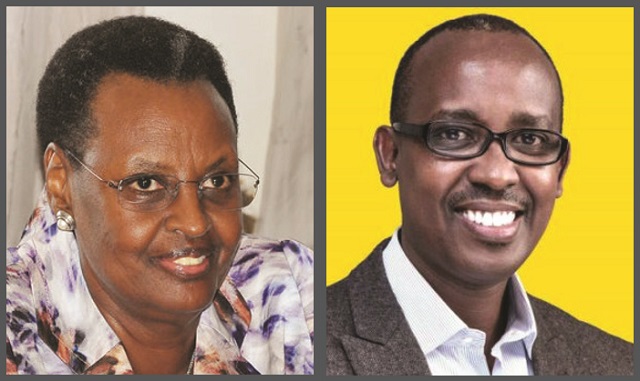
Such was the impression of Sudhir amongst key decision makers who could have intervened in his issues.
At the central bank, there were other dynamics that also didn’t favour Sudhir. Although Bagyenda has for long been known as the iron lady of the banking sector, Sudhir enjoyed a good relationship with her. But when Sudhir’s troubles worsened, she simply followed the law. Part of the reason, is that she was constrained. On top of being too technical and a stickler to rules and regulations, others felt that she had a sort of conflict of interest.
Her sister was the head of Crane Bank Rwanda. If she had done anything to save Sudhir her workmates would have suspected something. But as the fall out between BoU and Sudhir intensified, it became clear that everyone at the institution was gunning to crush him. They had severally warned him that he couldn’t fight the state—BoU was the state.
The Central Bank is highly institutionalized. Bagyenda’s juniors do assessments, which inform the Bank’s position. For instance, one of the officers at the bank told this reporter that Crane Bank had been warned severally from as early as 2007.
The official felt that the central bank should have acted against Sudhir years ago. “We had noticed a lot of red flags,” the official said, “but there wasn’t any concrete evidence and getting this concrete evidence required a lot of resources which the governor could not put at our disposal on the basis of mere suspicions.”
That is why when complaints mounted and it appeared apparent that depositors’ money was at risk, the bank commissioned a forensic audit, which proved most of the suspicions we had.
Other officials at the Central Bank, including Governor Tumusiime Mutebile, were seen as Amama Mbabazi’s people and it was feared that they had not gotten over the fact that Sudhir had taken National Bank of Commerce owned by Mbabazi. “If NBC which was co-founded by the governor could be reined in,” an official at the central bank said, “Why not Crane Bank?”
But while NBC bank had compliance issues with the central bank, the general view is that it was closed because of political reasons. President Museveni had received intelligence that shareholder Amos Nzeyi had been shipping money out of the bank to build a financial war chest for the other shareholder Amama Mbabazi to oust President Museveni. Museveni had even asked the BoU governor to investigate NBC by the time it was sold to Crane Bank.
But there was another dynamic. The top management at the central bank was divided. Specifically, the governor and his deputy had not been on the best of terms.
Kasekende was supposed to be the Governor when Mutebile’s contract expired in 2015. However, when former Prime Minister Amama Mbabazi decided to challenge Museveni, the President felt that he couldn’t replace Mutebile as this would spoil the Kigezi vote. He decided to renew Mutebile’s contract. He consulted Muhakanizi on whether he could only renew the Governor’s contract for two years. But apparently, Muhakanizi said that the laws provided for only 5 years.
The renewal of Mutebile’s contract crashed Kasekende, sources said. Mutebile also knew that Kasekende was waiting for his job. At the heart of this, is why the two men had not been talking for months.
So, even when Mutebile was not in good health to study and be proactive about Crane Bank issues—he had to be supported to walk—his deputy also didn’t have the powers to take a decisive decision about Crane Bank.
Outside the bank, Sudhir had other problems. Apart from the central bank officials, the other key figure in the negotiations to save Sudhir was Attorney General William Byaruhanga. Previously Byaruhanga had been one of Sudhir’s lawyers together with his business partner Timothy Kanyerezi Masembe.
However, Sudhir and Byaruhanga later fell out over property. One of the properties they were fighting over is located near Rwenzori Courts, which is owned by Byaruhanga and Masembe. Sources say Byaruhanga felt that he had the genuine property title yet Sudhir also claimed to have a title for the same property.
This is why when Masembe picked the side of the Central Bank in this fight, Sudhir’s camp were quick to raise the connection with Byaruhanga as part of the problem. Sudhir raises Masembe’s conflict of interest as one of the issues in his defence against the central bank.
The other threat according to insiders was that Sudhir had become another power centre, others say. Usually, when politicians fall on hard times, they go to Museveni for money. But many, were now going to Sudhir and this gave the tycoon too much clout.
President Museveni has a history of taking issue with such situations. And some say it is situations that got fallen Greenland Bank owner, Sulaiman Kigundu into trouble. Apparently, a source intimated to this reporter that some people went to Museveni for money. Museveni promised to assist them but delayed. Later when he met them again and asked them about their issue, they said that Kiggundu had assisted them. “Apart from his presidential ambitions,” the source said, “that was the beginning of his troubles.” Greenland Bank was closed.
Indeed, some suspect that President Museveni stayed away from Sudhir issues because he felt, just like the officials at the central bank that Sudhir had become too powerful and too arrogant and needed to be controlled.
At the height of his troubles, Sudhir owned over 400 prime properties and Uganda’s fourth largest bank worth Shs. 1.8 trillion.
 The Independent Uganda: You get the Truth we Pay the Price
The Independent Uganda: You get the Truth we Pay the Price



Mr. Museveni reminds me of Al Capone, the God father. Uganda is being run Mafia style.
The article has a lot of hear say – it misses FACTS – all said though this piece has now and forever definitively buried Sudhir – its him now against the STATE – Janet was wise to say – ” Stay away from that Mans issues” — the fact here is –going near his interests now will land your linen in public platforms……….URA is coming after him NEXT………..God strengthen Sudhir; he will overcome- the same will and instinct that grew him will redeem him – wisdom should be excercised when you choose to fight the state – especially one with an economy and statecraft similar to Uganda.